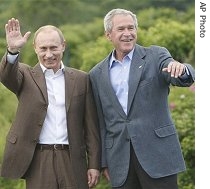2007年VOA标准英语-US, Russia Remain Divided on Kosovo Issue
搜索关注在线英语听力室公众号:tingroom,领取免费英语资料大礼包。
(单词翻译)
By Andre de NesneraWashington
03 July 2007
The United States and Russia remain far apart on the issue of Kosovo. In this report from Washington, senior correspondent André de Nesnera looks at the conflicting views.
 |
| President George W. Bush greets Russian President Vladimir Putin at Walker's Point, the Bush family compound in Kennebunkport, Maine |
A recent plan by U.N. envoy3 Martti Ahtisaari calls for Kosovo's independence under international supervision4. The Kosovo Albanians accepted the plan - albeit5 with reservations - while Serbia rejected it outright6. Serb officials say Kosovo has been and always will remain part of Serbia.
Washington and Moscow have opposing views on the merits of the plan. The United States strongly supports Kosovo's independence. Russia is opposed to it and has threatened to use its veto if the proposal comes up for a U.N. Security Council vote.
At the recent summit meeting in Kennebunkport, Maine, U.S. President George Bush and his Russian counterpart Vladimir Putin discussed Kosovo, but no breakthroughs were announced. U.S. National Security Adviser7 Steven Hadley told reporters diplomats8 on both sides will continue talks on the subject.
Robert Legvold, a Russia expert at Columbia University, says issues dividing Washington and Moscow are deep and substantive9.
| Kosovo Police patrol on the main bridge of the ethnically divided town of Mitrovica |
Legvold says a Russian veto could have dangerous consequences for the region.
Jason Lyall, a Russia expert at Princeton University, agrees.
"If Russia vetoes it, and then Kosovo goes ahead and declares unilateral independence on the ground, and then you've got the United States which is probably going to recognize Kosovo independence, but the European Union will split, then you are going to have a major diplomatic event and you might have violence on the ground," he explained.
Lyall says Russia's opposition13 to independence goes beyond standing14 by its Serb brethren. He says Moscow is worried about the legal precedent15 it would set in world politics.
"If you have a Kosovo that becomes independent, you have now set a legal precedent for foreign intervention16 in states to justify17 and legalize secessionist movements," he added. "And Russia looks at Kosovo through Chechen eyes. And it very much sees the experience of Chechnya and other republics in its south. And so this is a legal precedent that we do not want to touch. And so I do not know how the West finesses18 this with Russia. It's not really the Serb issue at all, it's really the legal precedent that it sets and this is going to be a major sticking point."
Experts say many governments are closely watching to see how the Kosovo situation will be resolved, hoping that it would not increase ethnic secessionist tendencies in their neighborhoods.
 收听单词发音
收听单词发音 




